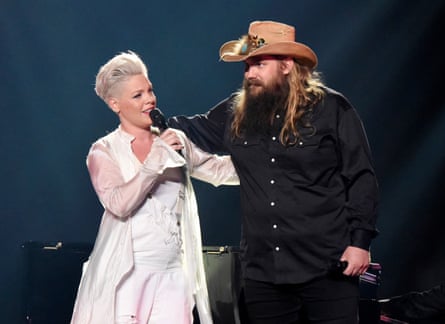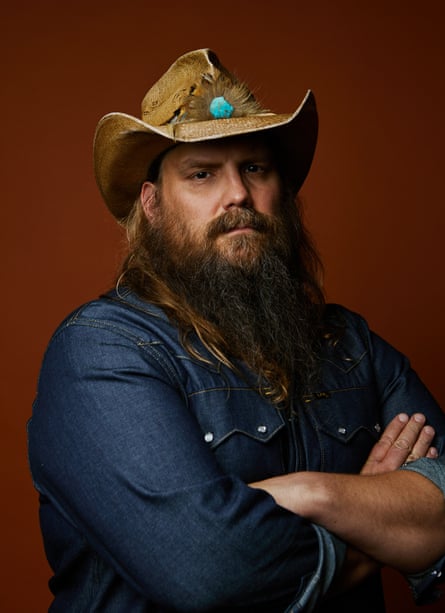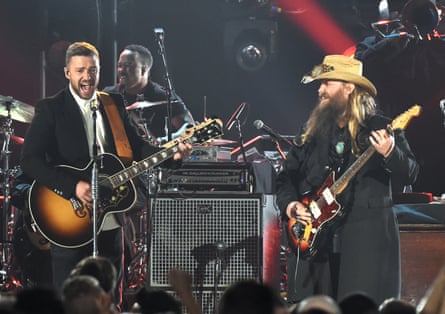Chris Stapleton has played five arenas in the UK over the past week, on a tour dubbed the All-American Road Show. Posters depicted his grandly bearded, cowboy-hatted visage framed by hills and skies in colours of red, white and blue. At first listen, his country music seems just as all-American. The 46-year-old has been writing and singing about women, heartbreak and drinkin’ for more than 20 years – whiskey alone has prompted Tennessee Whiskey (originally recorded by David Allan Coe), Whiskey and You, Whiskey Sunrise and his version of Willie Nelson’s Whiskey River; Stapleton recently launched his own brand of the stuff, Traveller. He’s sung the national anthem at the Super Bowl, and duetted with Taylor Swift. When discussing the upcoming election in November, I can almost hear a bald eagle cry as he declares: “I’m voting for America and a good glass of whiskey.”
But Stapleton, a true American superstar with 10 Grammys and 22 million monthly listeners on Spotify, is rather more complicated than your average truck-drivin’ country singer – and he’s all too aware of the stereotypes. His atmospheric 2020 song Hillbilly Blood is less a country number and more a string of southern-gothic vignettes, “born out of a riff that sounded pretty mean”, and inspired by his native Kentucky. “The people where I’m from, sometimes we’re looked down upon as not as educated or not as smart, or that we don’t have much money, or any of those things,” he says.
On his biggest recent hit, White Horse, he sounds like a classically macho country-rocker – until you realise he’s running away from love, too afraid to be a heroic “cowboy on a white horse / ridin’ off into the sunset”. As well as the Swift duet, there’s another with Metallica. And while country peers such as Jason Aldean have recently been dealing in aggressive nationalism, Stapleton is writing songs like Watch You Burn, a furious anthem about the 2017 mass shooting at Route 91 Harvest festival in Las Vegas, where 60 people were killed. “It’s important that you write songs sometimes that are timely,” he says, over the phone. “That’s part of our duty as songwriters, to connect with people in those ways: anger and frustration.”

He certainly has the quintessential country roots, though: while Loretta Lynn sang of being a coalminer’s daughter, Stapleton is a coalminer’s son, and his mother worked at the local health department. He grew up in Staffordsville, a small, “three stoplight” rural town, where “the Friday night football game was the big gathering of the week, then it was church on Sundays. That was kind of it.”
His earliest musical memories are of playing guitar with his uncle, and of his dad playing outlaw country and old R&B in the car. “When my mom wasn’t in the car it would be a little louder than it should have been for children, probably,” says Stapleton. “But he loved to listen to music, and a lot of my love for my music probably comes from that.”
He went to Nashville to study biomedical engineering at Vanderbilt University, then switched to business school, but he “just didn’t have an interest in doing any of that – a very strong disinterest, in fact”. Having taught himself guitar to a decent standard, he realised he could have a career in music when he met a salaried songwriter at EMI around the turn of the millennium. “I had no idea that was a job,” he says. He assumed if someone was singing a song, they wrote it. “I didn’t know that there was an entire community of people who, behind the scenes, were kind of song-factories. I became enamoured with that very quickly, and said: ‘Well, this is the job that I need to have.’”

Over the next decade or so, Stapleton earned a reputation as a prolific, versatile songwriter for country stars old (Tim McGraw, Kenny Chesney, George Strait), and new (Luke Bryan, Dierks Bentley, Blake Shelton). In 2015, he even had the great honour of seeing a song he’d co-written with Thomas Rhett, South Side, performed by animated rodents in Alvin and the Chipmunks: The Road Chip. Stapleton had become another of Nashville’s song factories – he reckons he’s written more than 1,000 of them – but he never felt “like a cog in a machine. That’s not very romantic or sexy, but it was romantic. To get to dig in with all the people that I had gotten to dig in with – the best of the best in the country music songwriter world – was a real privilege: ‘the art behind the art’ kinda thing.”
In this environment, Stapleton never felt compelled to perform himself – “Why would I? – but he had a number of “perfectly good songs sitting around going to waste”. So he formed a bluegrass band to play them called the SteelDrivers, followed by southern rockers the Jompson Brothers, before going solo. “My wife thought I was crazy because it was an income hit to go on tour,” he says. “I probably gave up 40% of my income just because I wasn’t working as hard at songwriting.”
The title track of Stapleton’s debut album, Traveller, was composed while he and his wife, the singer-songwriter Morgane Stapleton, drove through New Mexico in 2013 (they met while working in adjacent publishing houses, married in 2007 and now have five children). The road trip had been her idea: she spent $10,000 on a Jeep in Phoenix, Arizona, and the 1,600-mile drive back to Nashville would be a welcome distraction for Stapleton, whose father had just died. “The whole record in a lot of ways was dedicated to him,” says Stapleton. “I tried to make a record that I thought he would have liked to have heard be made. I miss my father a great deal – he never got to see what we’re doing now. Never got to even have a notion of that. And you know, I find that difficult.”
Traveller initially made little headway on mainstream country radio. “It wasn’t singles-based,” Stapleton says. “We were just going to play shows on it, and that was unusual.” But then came the 2015 Country Music Association Awards. A 37-year-old Stapleton took to the stage with Morgane and Justin Timberlake for a performance of Stapleton’s Tennessee Whiskey and Timberlake’s Drink You Away. Stapleton’s soulful crooning and brooding stage presence were electric, and the audience were stunned. The day prior, he still had a number of gigs with half-sold tickets. “The next day, they were all gone,” he says. “We knew there was a different ballgame, for sure.” Traveller re-entered the Billboard album chart at No 1, and has now sold more than 6m copies in the US.
Stapleton’s breakthrough came at a time when Nashville was dominated by bro-country; the upbeat, poppy sub-genre preoccupied with trucks, women, beer and partying, sung by young men in double denim. Labels and listeners longed for something fresh, and Stapleton’s music – a cocktail of rock, Americana, bluegrass, R&B and soul, with a rare vulnerability in his lyrics and a raw expressiveness in his voice – was what everyone was looking for, as was his look: part biker, part throwback to the outlaw country stars of the 70s. He believes the essence of country music is “stories”, and the Grammy-winning You Should Probably Leave is one example of his own talent in that regard: as two former lovers try and fail to resist temptation, the song crackles with shame and erotic tension.
Stapleton became that rare thing: a crossover country superstar. Ed Sheeran and Adele called on him as a collaborator. Bus-loads of tourists began arriving outside his house in Nashville twice a day (“that felt a little unnerving”), while one fan drove two states over “and just kind of showed up in my driveway. That’s a level of fandom I don’t quite understand. Sometimes, if you’re trying to eat lunch with your kids or something like that, maybe you don’t want to be ‘on’. But that just comes with the territory.” His mum is evidently more comfortable with his fame – prior to one awards ceremony, “I was talking to her on the phone, and she said: ‘Well, have fun getting your awards!’ Like it was a foregone conclusion. She has an overabundance of pride.” And did you win that night? “Probably!” he says, laughing.

By 2023, a GQ headline was asking “Is Chris Stapleton the one thing America could agree on?”, and for all that he trades in occasionally angry and even subversive songwriting, he has cultivated universal admiration by being very even-handed.
Of the pressure celebrities are under to endorse a presidential candidate, he says: “I’m not saying celebrities shouldn’t endorse people – that’s American. I also think the right to keep that private, and the right to let politicians be politicians, to let people make their own choices based on what politicians say and do … that’s American, too.” He pays no attention to culture wars or online discourse (“I don’t give a shit about any of that”), and amid country’s recent boom in the pop charts thanks to the likes of Beyoncé, Shaboozey, Dasha and more, he is welcoming to the newcomers: “The notion of drawing lines or saying you can’t participate because you’re not from somewhere, whatever, that doesn’t interest me”.
He has respect for and is moved by soldiers, and “all kinds of public servants” who “defend and protect”. Asked whether country music has issues with intolerance or sexism – last year country chart-topper Maren Morris distanced herself from the scene because of its misogyny and participation in culture wars – he has a politician’s non-specific condemnation: “There’s intolerance and sexism everywhere … you’re kidding yourself if you think those things don’t exist.”
To Stapleton, American values are about “fairness and defending those who can’t defend themselves, or standing up for each other”, he says. “About coming together, understanding points of view that aren’t yours. American values would be someone who grows up in the city getting to sit down and talk with somebody who didn’t, like myself. And then we can still find common ground.”
The stakes are so high with next month’s election that some might find Stapleton as evasive as the protagonist in his song White Horse. But as those tour posters suggest, he’s about being red, white and blue, rather than red, white or blue. “I doubt that all Americans could agree on me,” he continues, referring to that GQ headline. “But I’ll take it. If that’s true, I think it’s wonderful, because I think we need more things we can agree on.”
Source: theguardian.com


